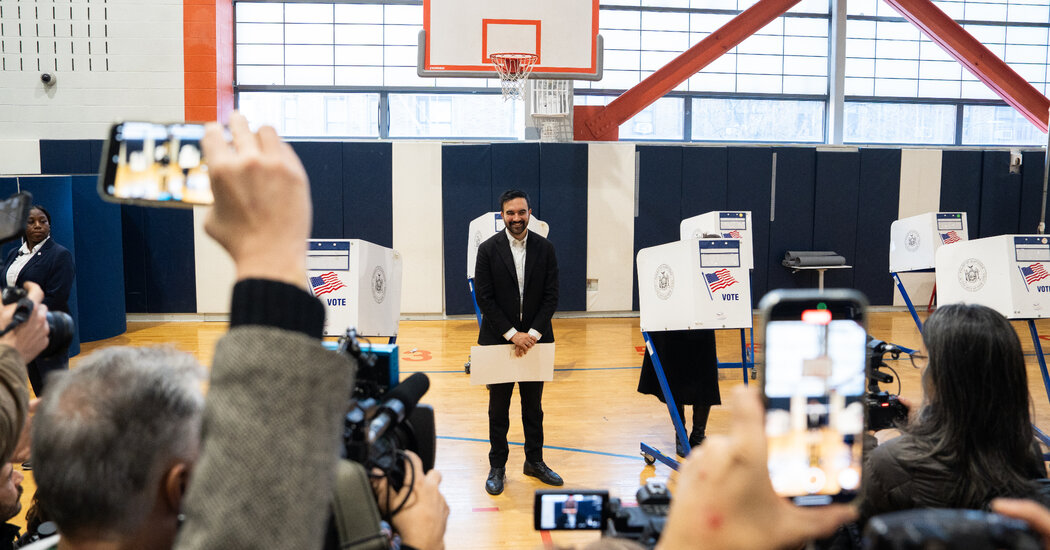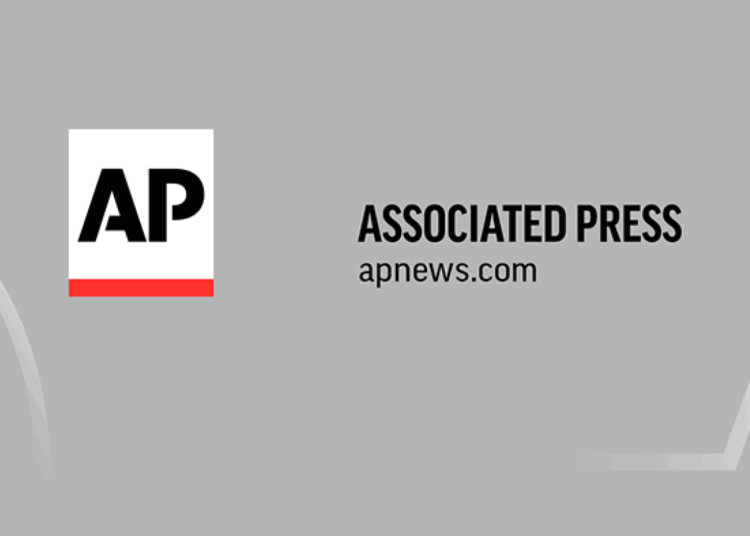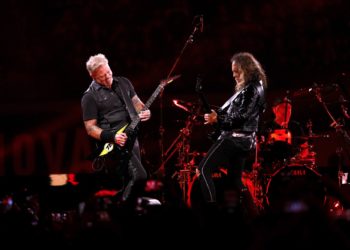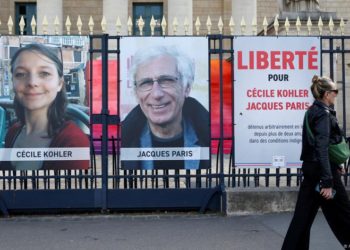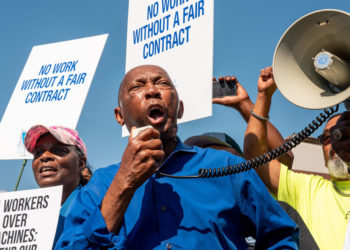It was one of the first unconventional things Zohran Mamdani did campaigning for mayor of New York: jumping inside the halal carts.
Standing in his suit by the grills, as vendors chopped chicken and fried falafel, he interviewed them about the problem of “halal-flation,” as he called it — why plates of rice and meat now cost $10 instead of $8 — and asked how he could help.
At first, many Muslims wondered, “Would New York City elect a Muslim mayor?” said Mohamed Attia, the managing director of the Street Vendor Project who helped connect the candidate with the carts. But, Mr. Attia added, the vendors were inspired, and praise of Mr. Mamdani spread to their customers and to the mosques.
On Tuesday, the city for the first time answered the question with a resounding yes.
With his election, Mr. Mamdani, a 34-year-old Democrat, has defied anti-Muslim backlash to his candidacy and shattered a barrier that seemed insurmountable since the Sept. 11 terror attacks transformed what it meant to be Muslim in the city. While there are four Muslims in Congress and a few Muslim mayors of smaller Americans cities, Mr. Mamdani, as mayor of America’s financial center, will become the country’s highest-level Muslim executive.
He won while fully embracing his Muslim faith on the campaign trail, even as divisions over antisemitism, Islamophobia and the war in Gaza dominated the election, including within New York’s large Muslim and Jewish communities.
Questions about Mr. Mamdani’s religious beliefs, perhaps conflated with his political intentions, were frequently raised by his critics throughout the campaign. In a TV interview last month, Mr. Mamdani, a critic of Israel, wouldn’t give a direct answer when asked whether Hamas should lay down arms and step aside in Gaza, which spurred vitriolic attacks and suggestions that he was a terrorist sympathizer.
In another interview, in June, he declined to condemn the phrase “globalize the intifada,” which is considered a rallying cry for liberation among Palestinians. Many Jews, however, consider it a call to violence. He later said he would no longer use the phrase and would discourage others from using it.
Despite the backlash, Keith Ellison, a Democrat who is the attorney general of Minnesota, said Mr. Mamdani’s election showed “dramatic improvement” from his own election in 2006, when he became the first Muslim to be elected to Congress.
“It speaks well to our country,” Mr. Ellison said, “because at a moment when arguably the president won election by appealing to people’s desire to exclude, Americans are trying still to include.”
Also on Tuesday night, voters in Virginia elected Ghazala Hashmi, a Democrat, as lieutenant governor, making her the first Muslim woman to win statewide office there.
Democrats have for years struggled to organize religious voters, but in just a few months Mr. Mamdani activated a new base of Muslim voters and attracted a progressive cross-identity coalition that supported his goals, like making New York affordable and opposing Israel’s military campaign in Gaza, often on moral grounds. Now, the most prominent face of progressive religion in the Democratic Party is not a liberal Christian but a Muslim who practices his faith while also creating space for interfaith and secular morality.
Many of Mr. Mamdani’s political views are not necessarily tied to his religion. But he has also unabashedly centered his faith, reaching out to the nearly one million Muslims in New York who, as he put it, had for too long been taught to live “in the shadows.”
As of June, about a third of New York’s Muslims were registered to vote, but only about one in 10 voted in the last mayoral election, according to the Council on American-Islamic Relations. Muslims make up about 1 percent of the U.S. population, according to the Pew Research Center.
Muslims in America historically have affiliated more with the Democratic Party. But in the past couple years Muslims have emerged as a more fluid group. Notably, in Michigan last year, Arab-American voters helped deliver the state for President Trump, some directly citing frustration with the Biden administration’s support for Israel. Mr. Mamdani’s rise has shown how Muslim voters are demanding more engagement and recognition of their voice.
Mr. Mamdani visited more than 50 mosques during the campaign, regularly going to different ones on Fridays for jummah prayers. He campaigned while fasting for Ramadan and had a Muslim wedding ceremony, known as a nikkah, in Dubai, where his wife’s family lives. When he visited the family of a police officer who was killed in a Midtown Manhattan shooting in July, they told him that he and the slain officer had crossed paths at Eid prayers.
“There is a constant effort to try and draw a small barrier around who can be American,” said Abdul El-Sayed, a Democrat and former public health director running for Senate in Michigan. “That is what makes this moment so special.”
Like Mr. Mamdani, Mr. El-Sayed has also drawn on the values of his Muslim faith as he seeks the responsibility of public office. “There’s a beautiful tradition in our faith that if you were to eat a full meal, and your neighbor could smell your meal and didn’t have, then you would be committing a sin,” he said.
“For all of us, ask yourself: What is wrong with sharing your food? What is wrong with sharing your resources?” he added.
Mr. Mamdani’s religious values, and the policies that flow from them, also stand in contrast to the conservative brand of Christianity that has been elevated within the Republican Party.
“We are in a moment of the pluralists versus the anti-pluralists,” said Zeenat Rahman, executive director of the Institute of Politics at the University of Chicago. Anti-pluralists currently have a lot of state support, but most Americans function as pluralists in their day-to-day lives, she said.
“The fact that he could win in this climate says something to me about how Americans are craving leadership that reflects pluralism, not just tolerance but a real belief that our diversity strengthens our democracy,” she said.
Mr. Mamdani “has been allowed to be seen in the complexity of who he is,” Ms. Rahman said, defined not simply by his faith but by his policies and leadership. “To me that is the progress in the story,” she added.
After Sept. 11, when Mr. Mamdani was about 13, his father, a political scientist at Columbia, wrote a book called “Good Muslim, Bad Muslim,” dispelling the stereotypical binary of Muslim political identities.
He dedicated the book to “Zohran and his mates” in Uganda, Cape Town, New York and New Delhi, in hopes that “together, they will no doubt remake the world they inherit from us.”
Even as Mr. Mamdani broke barriers for Muslims, his campaign particularly roiled Jews across the country. New York’s mayoral race came to symbolize the broader debates over antisemitism and anti-Zionism that have intensified since the Oct. 7 Hamas-led attack on Israel.
Muslims watched his campaign with pride but also with fear, as his opponents were accused of inciting hatred against Muslims. Curtis Sliwa, the Republican nominee, falsely accused Mr. Mamdani of supporting “global jihad,” and Andrew Cuomo, who ran as an independent, participated in an exchange suggesting that Mr. Mamdani would celebrate another Sept. 11-like terrorist attack.
Mr. Mamdani responded with an emotional speech about his experiences of bigotry and Islamophobia. It was another way he elevated the daily experiences of Muslims in the city.
When Little Flower Cafe, a halal eatery in Queens, opened in 2022, the owner, Ali Zaman, said Mr. Mamdani started popping by regularly to order his favorite drink: a pink chai made with green tea mixed with baking soda, as well as cardamom, rose water and milk.
Initially, Mr. Zaman, 29, was hesitant about Mr. Mamdani, wondering if he was like other politicians who he felt sold out over time. But during Ramadan last year, months before announcing his candidacy, Mr. Mamdani reached out to host an iftar dinner at Mr. Zaman’s father’s restaurant, Sami’s Kabab House.
They prayed across traditions — “I was raised Sunni, he was raised Shia” — and Mr. Mamdani said he wanted to mourn together what he called the genocide of Palestinians in Gaza, Mr. Zaman recalled.
“That was the night I was like, Oh, I have no doubt about what kind of person he is,” Mr. Zaman said. “He was like a really cool Muslim brother. He was a brown brother.”
Elizabeth Dias is The Times’s national religion correspondent, covering faith, politics and values.
The post Would New York City Elect a Muslim Mayor? An Emphatic Yes. appeared first on New York Times.
